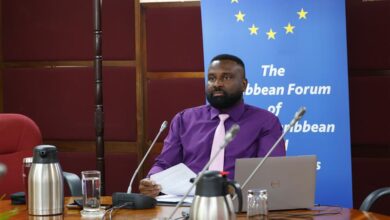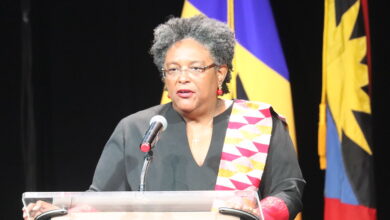The threats to the Region’s banking sector via the trend of de-risking could have “cataclysmic ramifications” for the Caribbean, and a “relentless” campaign must be waged against it, Chairman of CARICOM and Prime Minister of Belize, the Hon Dean Barrow warned on Monday.
At the opening ceremony of the Twenty-Seventh Intersessional Meeting of the Conference of Heads of Government of CARICOM in Placencia, Belize, Prime Minister Barrow used much of his address to focus on the correspondent banking scenario and what it meant for the Community. The matter is a key agenda item of the two-day Summit, and a Meeting of Finance Ministers was held earlier on Monday to craft a Regional response. A Committee of Ministers of Finance on Correspondent Banking, chaired by Antigua and Barbuda’s Prime Minister and Minister of Finance Hon. Gaston Browne will lead the response to this issue. The Committee is supported by leading Regional institutions including the Committee of Central Bank Governors (CCBG), the Caribbean Association of Banks (CAB) and the Caribbean Financial Action Task Force (CFATF).
The threat relates to the possible loss of access to the international financial markets by mainly the Regional indigenous banks. Several international banks, mainly in the US and Europe, have signalled to client banks in the Region an unwillingness to continue carrying their business. The so-called ‘de-risking’ by the global banks threatens to impact several critical services including remittance transfers. International trade, the facilitation of credit card settlements for local clients could also be threaten..
Prime Minister Barrow was recently in Washington to raise the matter of correspondent banking relationships directly with the regulators in the United States, and while he reported receiving sympathy, he pointed out that regulators have provided only an undertaking to indicate to their banks that Regional jurisdictions “have done and are doing everything we can to be fully AML/CFT compliant; and that there was therefore, in principle, no objection to those banks doing business with us”. The US regulators, he added, placed the matter squarely at the feet of sovereign US banks.
One of the suggestions Prime Minister Barrow put forward for consideration on Monday evening, was for respective country banks to get together across jurisdictions and, as a bloc, approach target banks in the United States for pooled correspondent services. It is his view that the Region should be able to leverage the critical mass needed to make its business volume worthwhile in terms of risk/reward equation.
“Meantime our campaign, and I speak now of CARICOM, continues. And it cannot be other than relentless in the face of the possible correspondent banking Armageddon that we face. It is therefore a matter that looms extremely large on our Agenda over the next two days, and has already been the subject of a dedicated Finance Ministers meeting this morning,” he told the ceremony.
CARICOM Secretary-General, Ambassador Irwin LaRocque, who made remarks at the ceremony, also addressed the correspondent banking relationship issue and referred to it as an immediate existential threat. The Caribbean, he pointed out, was “inarguably one of those most adversely affected by these de-risking strategies and our people have already begun to feel the consequences of such arbitrary decisions”. He sought collective action to deal with matter.
“This situation threatens the financial and economic stability of our Region. It is having an impact on the ability of our people to receive their remittances and transfer their funds for trade and investment transactions. This state of affairs demands that we act collectively to address this issue with the relevant regulatory authorities and the international community,” the Secretary-General said.






